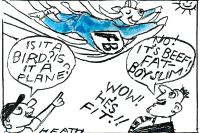Mr Tony Blair, the Prime Minister, asked by the Commons liaison committee if he would apologise for going to war with Iraq for the wrong reasons, said: ‘It has got rid of Saddam Hussein and he was a tyrant. I do not believe there was not a threat in relation to weapons of mass destruction. I have to accept the fact that we have not found them, but we have found very clear evidence of intent and desire. Whether they were hidden, removed or destroyed, he was in clear breach of UN resolutions.’ Mr David Blunkett, the Home Secretary, said he would try again to introduce a law against inciting religious hatred. The government announced a second toll-motorway parallel to the M6 for 50 miles north of Birmingham. A Lords amendment to the Children Bill allowed parents to smack their children if they did not inflict marks such as bruising that lasted for hours. Dr Rowan Williams, the Archbishop of Canterbury, said that at stake in the global consumption of fossil fuels was ‘our continuance as a species capable of some vision of universal justice’. ‘The pensions crisis is up there with terrorism or global warming as a threat to much of what we value,’ Mr David Willetts, the shadow secretary for work and pensions, said in a lecture. The average public-service employee takes nearly 11 days a year of sick leave, against eight in the private sector, according to the Chartered Institute of Personnel and Development; this cost the equivalent of a tax of 1 per cent on everyone’s income. The sacking of Sir Peter Davis as chairman of Sainsbury’s gave no immediate stock market lift to the company. Some of the eight British sailors and marines arrested, then released, by Iran said that their boats had been ‘forcibly escorted’ from Iraqi waters by Iranian revolutionary guards.






Comments
Join the debate for just £1 a month
Be part of the conversation with other Spectator readers by getting your first three months for £3.
UNLOCK ACCESS Just £1 a monthAlready a subscriber? Log in